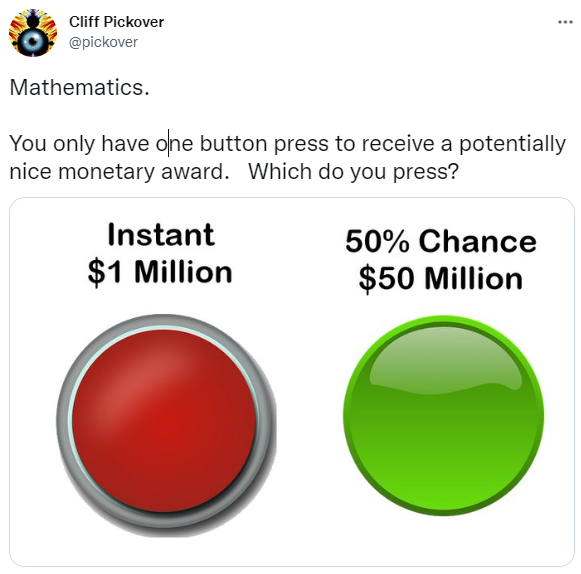Recently, I saw this (loaded) question on Twitter:

The implication was clear – you should do the math on expected value:
- Red button is 100% chance at $1 million = $1 million
- Green button is 50% at $50 million = $25 million
But what you pick depends on a variety of factors beyond the math.
Table of Contents
Note the Inherent Bias of Any Choice
Before we get into the choice itself – just note all the bias in this question.
It starts with the term “mathematics” – to tell you that you should do the math and then pick the one with the higher expected value.
Then you see how the buttons are red (stop!) and green (go!).
Then there’s the reality that $1 million can change your life and if you immediately gravitate towards the “inferior” answer (mathematically) – maybe you’re a moron because you can’t do math. Or you’re desperate. Who knows.
I’m not going to put that on the OP (it’s a silly Twitter question) but if you’ve only known a warm house and a full belly, you may not realize how many people live. Or you do and this is intentional because you want attention – who knows.
Whenever you are faced with choices in your life, try to identify bias so you can make a decision with a clear mind. We are all humans and I’m not saying that the OP was nefariously steering respondents in a direction… but OP was steering respondents in a direction.
In this case, it was the “correct” choice based on expected value but expected value is just one factor in the vastly complicated equation that is life.
Speaking of which, what are the other factors?
What Is Your Financial Situation?
A dollar represents different things to each person.
If you are panhandling on the street, a dollar isn’t just a dollar. It’s a step towards you next meal.
If you’re a recent graduate loaded with student loan debt, a dollar isn’t just a dollar. It’s paying of your loans and perhaps buying a home.
If you are retired with a large nest egg, a dollar isn’t just a dollar. It’s just more in your bank account.
And so the choice between the two buttons is this – what impact does a guaranteed million dollars mean to you? And what does a shot at $50 million mean to you?
Some people don’t need a shot at $50 million and wouldn’t know what to do with it if they got it. That’s why you hear so many sob stories about lottery winners.
Maybe you’re happy getting an extra million and living your life as you normally would.
Mo’ money, mo’ problems – right?
What Are These “Mo’ Problems”
For most people, you wake up and have to take on your responsibilities.
And for most people, one of their major responsibilities is their job. If you were given $50 million dollars, you don’t have to work anymore. One of your major responsibilities has been removed and now you have to find out what to do with the extra eight-plus hours you used to spend at work.
This is a very difficult transition. Ask any retiree what this is like.
Many people conflate their identity with their work and when work goes away, some of their identity does too. That transition is hard.
There’s an adjustment period and some people navigate it better than others.
You also need to manage that money now. You can do this yourself or hire someone to do it for you.
If you do it yourself, you’ll have to decide what to do with it. If you do nothing, you’ll get stressed about how inflation is eating into your purchasing power. If you put it into an S&P 500 index fund, you’ll get stressed as it moves around.
Do you dollar cost average it in? Lump sum?
1% of $50 million is $500,000.
The S&P 500 index moves by over 1% a day several times a month.
Can you stomach that kind of movement without panicking that you may be making the wrong choices?
You can also hire someone to manage that money for you – which can remove some of the stress. But you have to pay that person at least 1% a year to management, if not more.
This means you’re paying someone $500,000 a year to manage your $50 million portfolio.
You’re paying someone half a million dollars a year!
And of course, people will say “these are good problems to have!” but they are not good problems to have. They are difficult problems with no right answer and your body will react to the stress.
And that’s if you win the $50 million! What if you don’t?
Consider Regret Minimization
I’ve always enjoyed this framework for decision making by Jeff Bezos – he calls it regret minimization (here’s the video where he explains it):
I’ve always liked this way of thinking because its one that considers your mental health.
50% of the people who pick the green button will walk away with nothing. They will not talk about the time that a wizard offered them a 50% chance at $50 million and they lost. Oops.
But 100% of the people who took the million will talk about it. They will be happy.
No one ever gets a million bucks for free and says “damn, I wish I took a shot at $50 million.”
A million dollars in the pocket is worth more than $50 million on a coin flip.
Remember This is Imaginary!
Finally, just remember that this choice is completely imaginary. No one will ever offer you this choice for absolutely no reason.
And we all know what the math says – take the 50% shot.
But we aren’t robots and we shouldn’t expect to act like it either.
You may face similar (less absurd) decisions, where math can give you the correct choice, but it won’t ever be like this where the guaranteed choice is life changing.
BUT!
If you do happen to get approached with a 100% life altering sum vs. 50% at an exorbitantly life altering sum, just know that you will have to (and you get to) live with whatever you choose. No one else has to.
Make sure you choose wisely.
Which would you choose? 😊




$1,000,000 now would let me leave my job today, not nine-ish years from today. Such an easy decision.
The math does not say the 50% chance at $50Million is worth $25Million. It’s not worth that at all. With only one shot at it then it’s worth either 0$ or $50Million. In no way is it equal to $25Million. That’s like saying one button will do nothing and one has a 50% chance of causing your death. That button is not equal to a button that will leave you half dead. I’d take the one million and walk away. That’s not life changing money to me but it’s still a nice add on.
Hi Jim,
I always enjoy your posts. I will be looking into the financial tools you mentioned at the end of this article. As someone who is pushing 80, I only wish I could find a financial advisor with the ability to explain complicated financial issues in language easy to understand, the way you do in your posts. Best wishes.